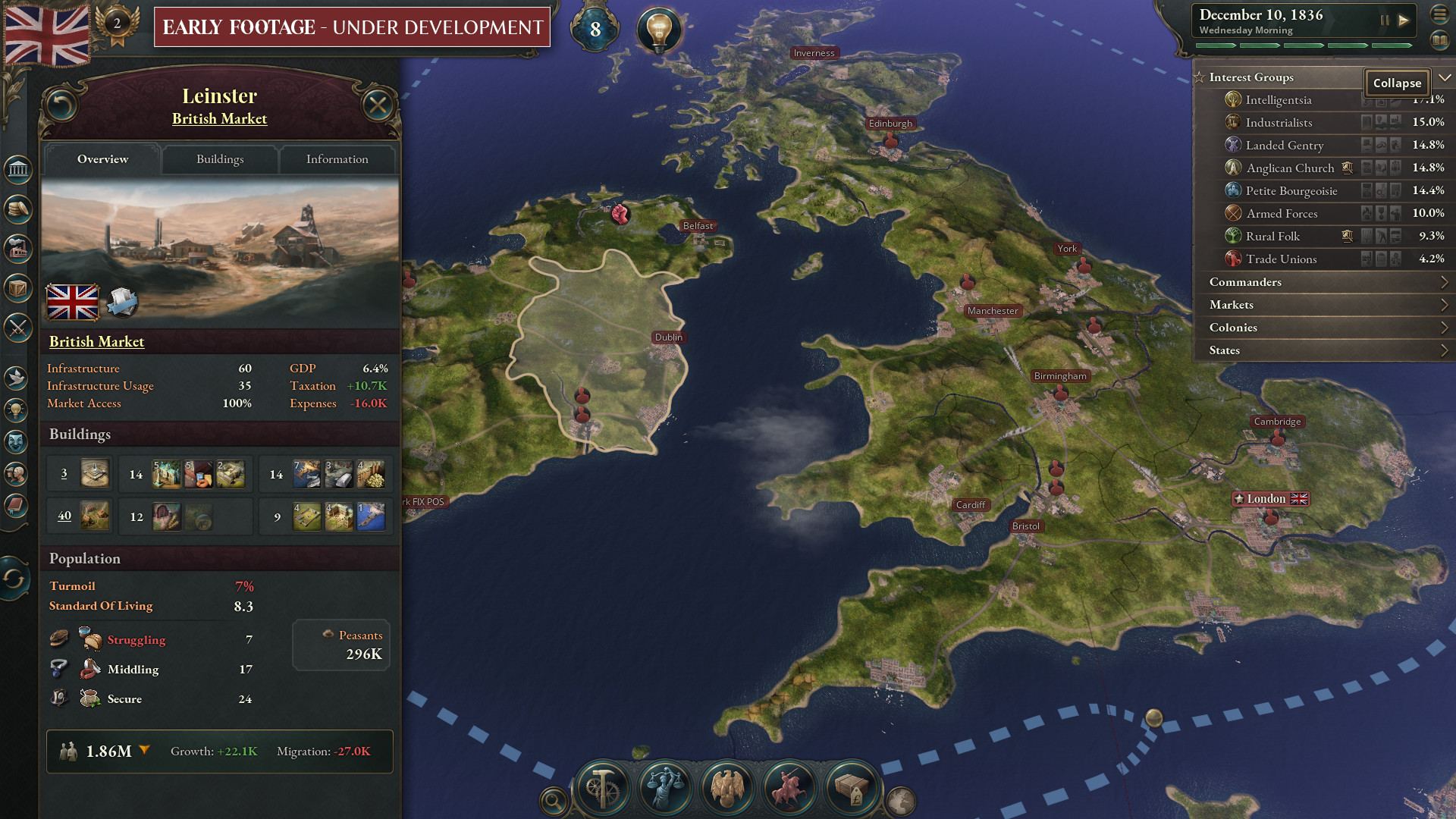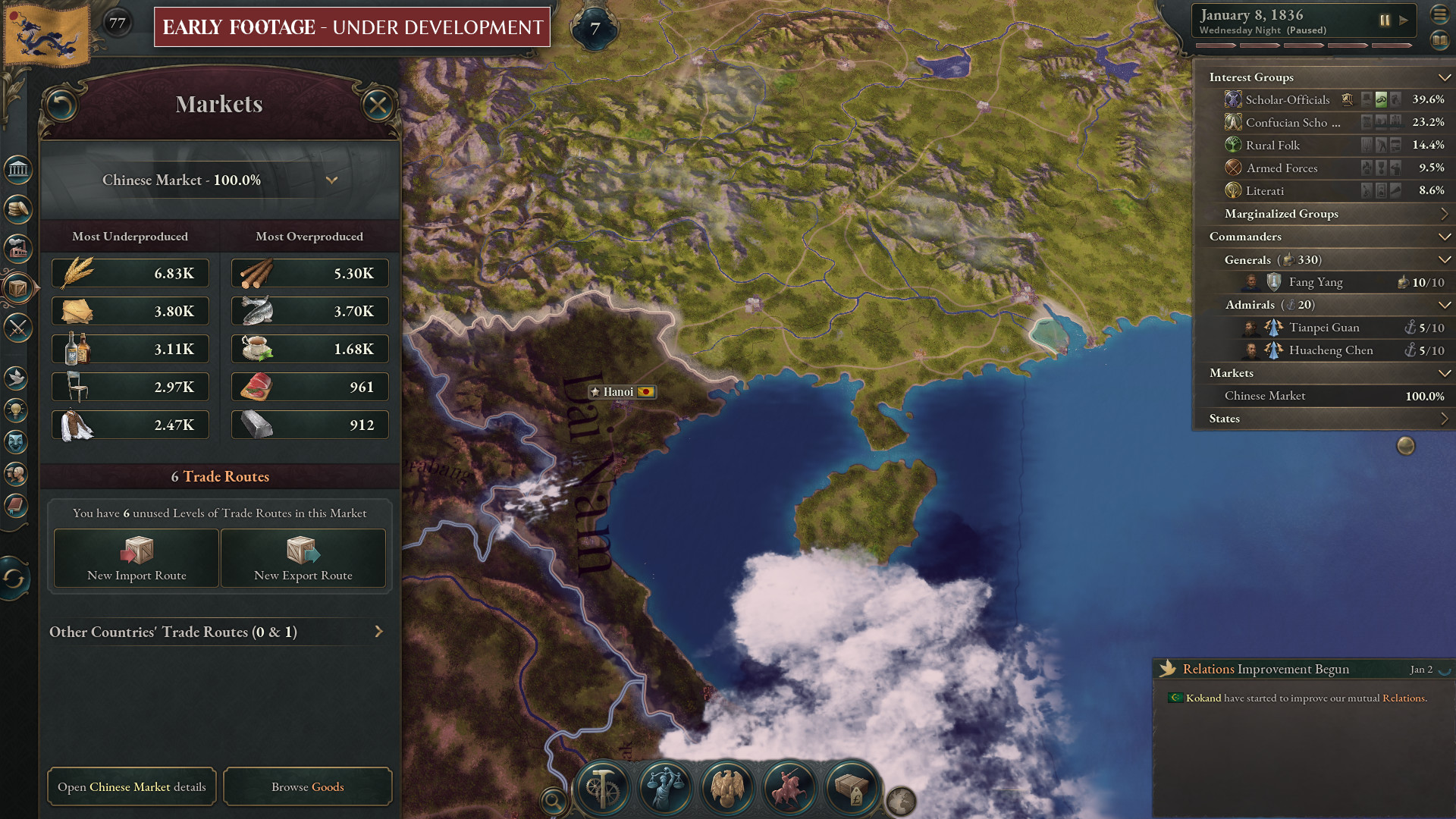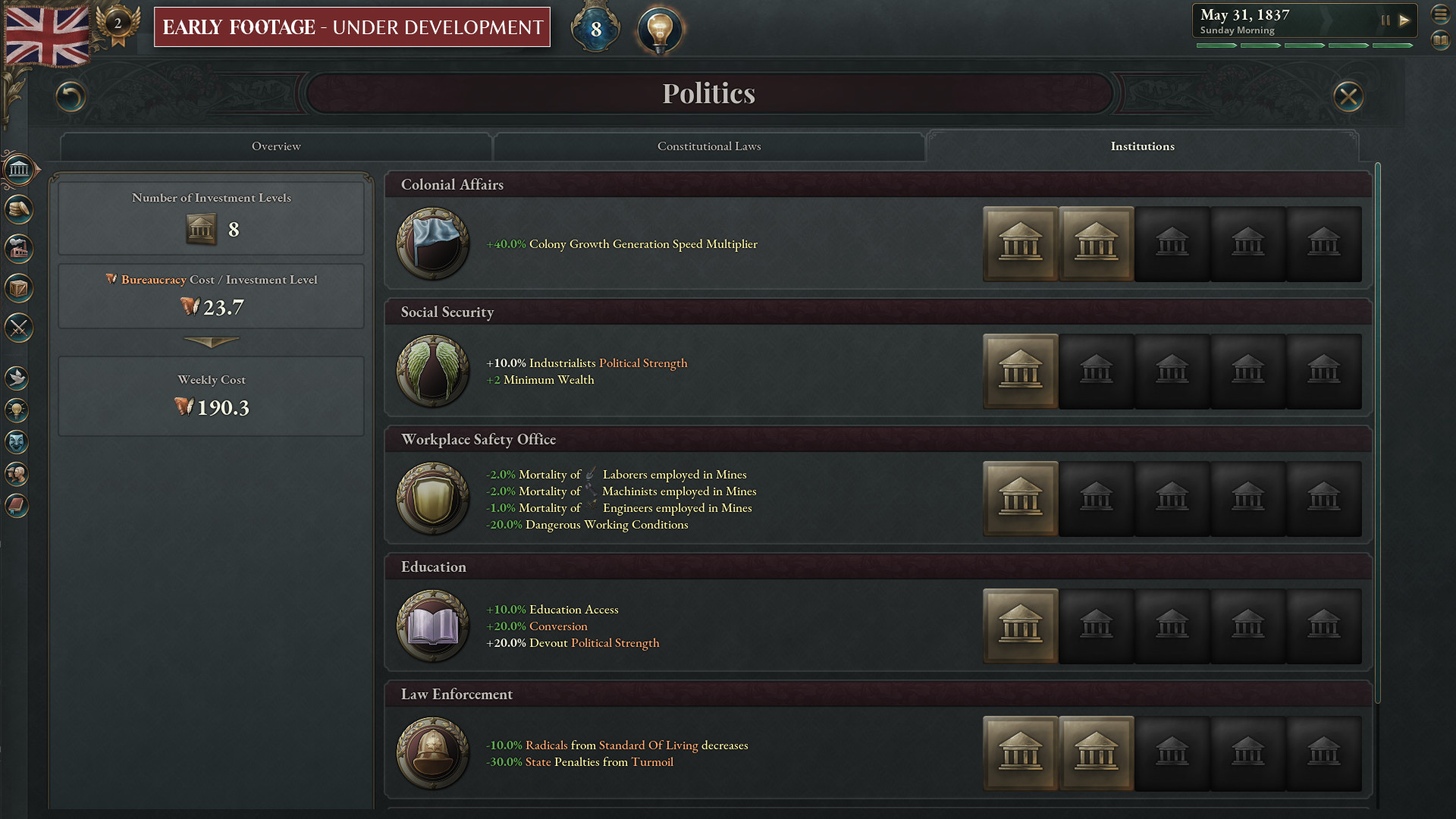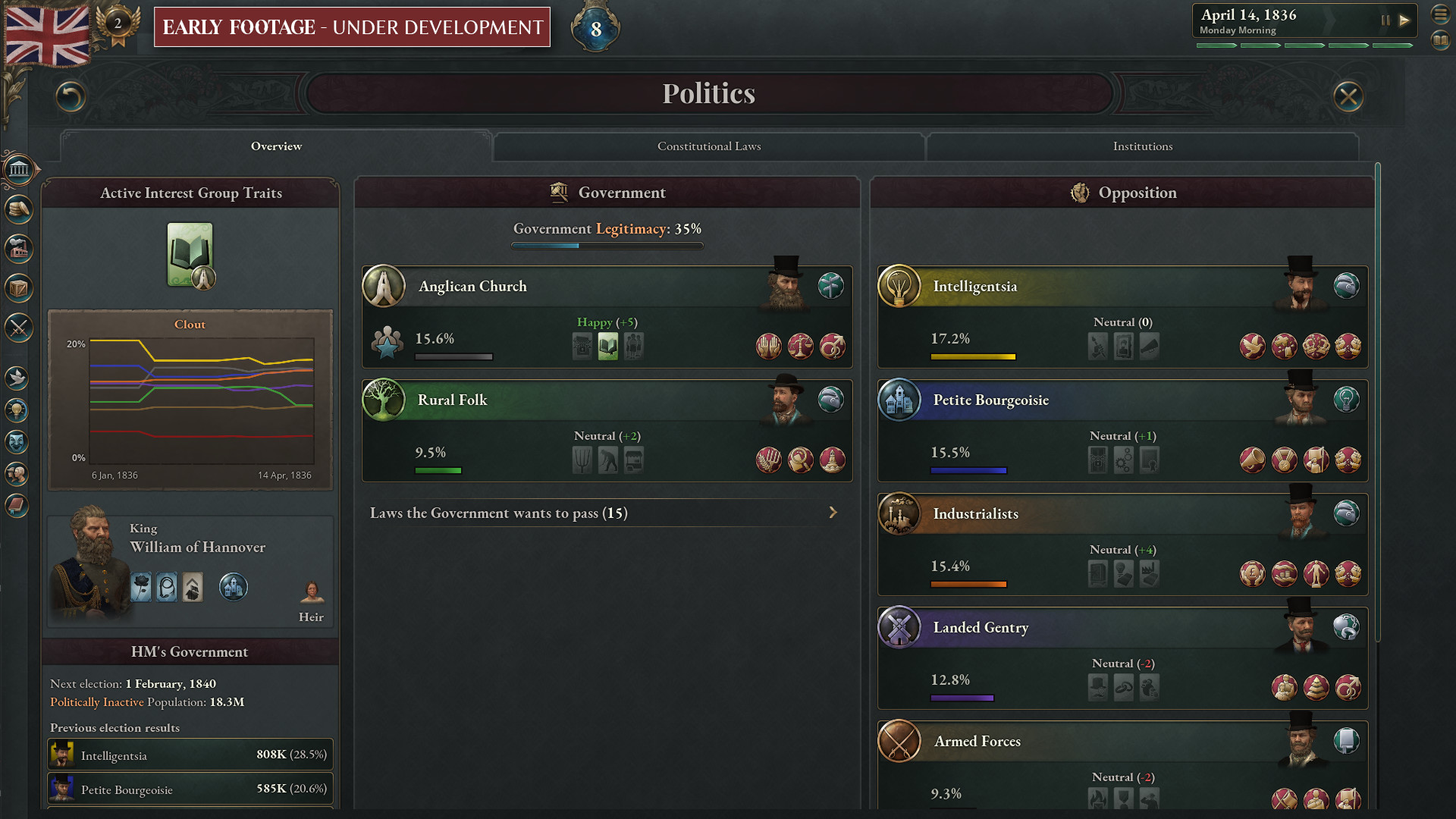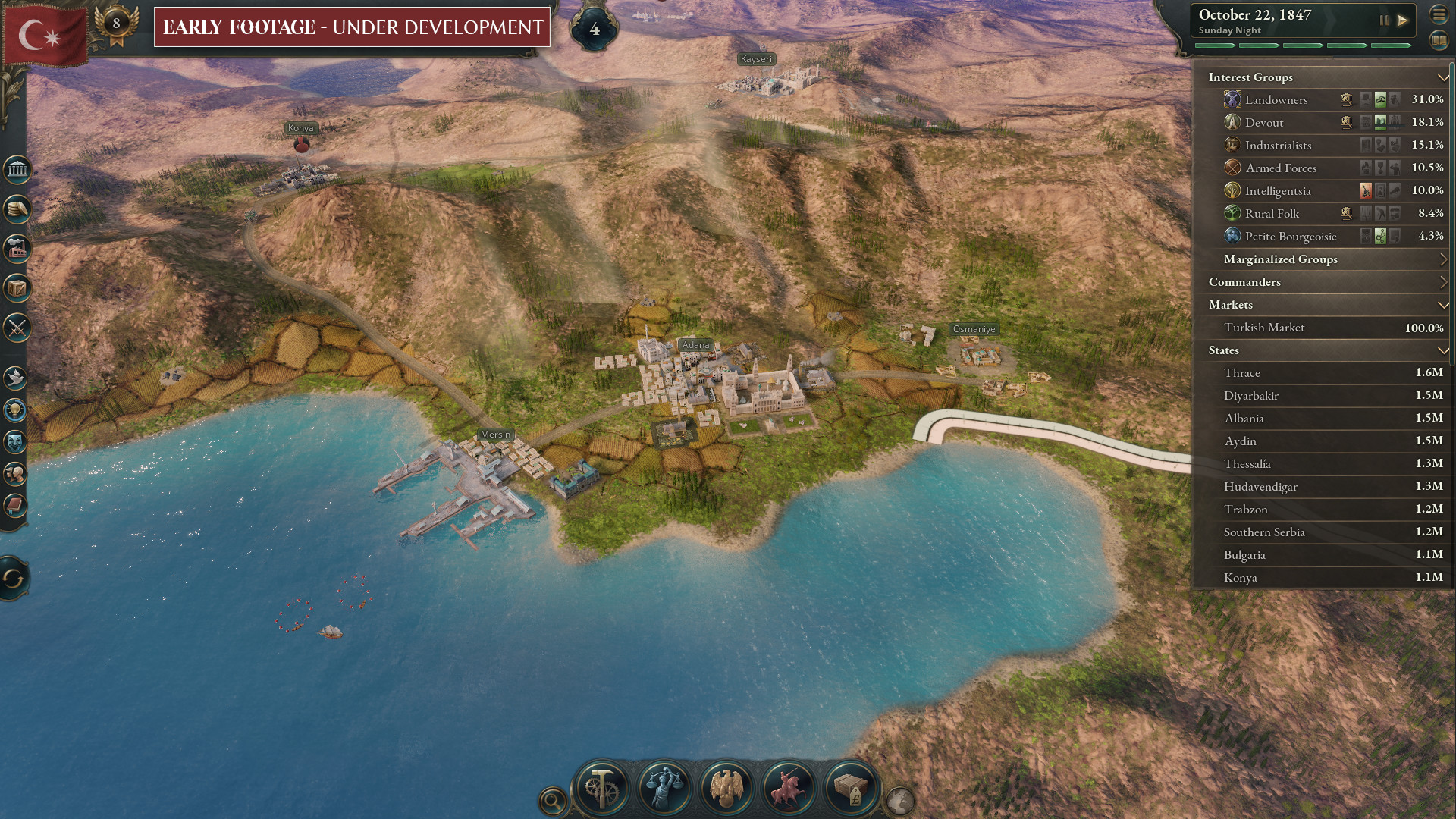SHAPE A GRAND TOMORROW
Paradox Development Studio invites you to build your ideal society in the tumult of the exciting and transformative 19th century. Balance the competing interests in your society and earn your place in the sun in Victoria 3, one of the most anticipated games in Paradox’s history.THE ULTIMATE SOCIETY SIMULATOR
- Lead dozens of world nations from 1836-1936. Agrarian or Industrial, Traditional or Radical, Peaceful or Expansionist... the choice is yours.
- Detailed population groups with their own economic needs and political desires.
- Reform your government and constitution to take advantage of new social innovations, or preserve the stability of your nation by holding fast to tradition in the face of revolutionaries.
- Research transformative new technology or ideas to improve your national situation.
DEEP ECONOMIC SYSTEM
- Expand your industry to take advantage of lucrative goods, taxing the profits to improve national prosperity.
- Import cheap raw materials to cover your basic needs while finding new markets for your finished goods.
- Secure vital goods to fuel your advanced economy and control the fate of empires.
- Balance employing available labor force with the needs for new types of workers.
PLAY ON A GRAND STAGE
- Use your diplomatic wiles to weave a tangled global web of pacts, relations, alliances, and rivalries to secure your diplomatic position on the world stage.
- Employ threats, military prowess and bluffs to persuade enemies to back down in conflicts.
- Increase your economic and military strength at the expense of rivals.
- Accumulate prestige and the respect of your rivals as you build an industrial giant at home or an empire abroad.
Hello and welcome to another Victoria 3 dev diary! Todays diary marks the start of dev diaries about Patch 1.2, which is the next major upcoming patch for Victoria 3 (release date to be announced). As with 1.1, 1.2 will contain a slate of bug fixes, UX improvements, AI improvements and so on, but also some more significant changes to game mechanics, which were going to go over in these dev diaries.
The particular changes well be talking about today, as alluded to by the title, is Autonomous Investment, which is something we said we were going to look into for our post-release plans back in Dev Diary #64 . What we said back then is that while we are never going to take construction out of the hands of the player entirely, we were open to the idea of non-government entities constructing buildings in a way not directly controlled by the country, and what we came up with is a system where the Investment Pool will be used by private entities to construct different types of buildings depending on your economic laws.
Before going over how all this works, I first want to mention that we recognize that the community is somewhat split on the issue of autonomous construction, and as such, weve opted to create a new Game Rule for Autonomous Investment. By default, Autonomous Investment is enabled, which puts the Investment Pool out of the hands of the player, but you can choose to disable it, which puts the Investment Pool back in the players hands and makes it work exactly as it does in the current 1.1.2 version of the game.
The Investment Pool Game Rule allows you to enable or disable autonomous construction with Investment Pool funds, depending on your personal preference

Regardless of whether Autonomous Investment is enabled, the Investment Pool works pretty much the same as it did before: Certain Pop Types with ownership shares in buildings pay part of their dividends into the Investment Pool, the funds in which can then be drawn on for construction. There are, however, a few key differences in 1.2 compared to 1.1.
Firstly, the types of Pops that invest have been expanded from just Aristocrats and Capitalists to also include Farmers and Shopkeepers. Capitalists invest the highest percentage of their dividends (20%), followed by Aristocrats at 10%, with Farmers and Shopkeepers investing only 5% each. The rationale here is that it wasnt only the wealthiest in society who invested in new businesses, and this also allows a small degree of investment under laws which strip ownership away from the Capitalists and Aristocrats (but more on that next week).
Secondly, the proportion of dividends that are paid into the Investment Pool varies in 1.1 based on your laws, which can have some pretty bizarre effects, such as switching to Laissez-Faire suddenly creating a bunch of Capitalist Radicals because they are now investing more money and thus end with a drop in their Wealth. The proportion of funds that are invested is now a fixed percentage based on pop type, which is then subjected to an efficiency bonus: Capitalists always invest 20% of their dividends, for example, but under Laissez-Faire, this investment is more efficient and ends up contributing more money to the Investment Pool.
There is also a general investment efficiency bonus for payments into the Investment Pool in small and mid-sized economies, and a penalty in very large ones, to ensure the Investment Pool is also relevant for mid-sized countries while not growing to such absurd proportions that it cannot possibly be spent in a 10 billion GDP country. These efficiency bonuses are meant to abstract a system of foreign investment, which is something weve also mentioned is on our radar in Dev Diary #64 but is a bigger rework that we are not tackling yet in patch 1.2.
Agrarianism gives a hefty bonus to the investments of your Farmers and Aristocrats, but reduces investments from Capitalists and greatly limits the types of buildings they can put their money into.
So how then, does the Investment Pool funds get turned into buildings when Autonomous Investment is enabled? Well, autonomously, of course! With Autonomous Investment, the Construction Queue is split into Private and Government Constructions, with Government Constructions being anything (regardless of whether its a Government building or not) ordered to be built or auto-expanded by the player or country-level AI, while a Private Construction is anything the Pops themselves are building. The Construction capacity of the country will be split between the Private and Government queues in a proportion based on your economic law, though if there isnt enough constructions queued of one type to use its full allocation, the excess can be used by the other queue instead.
In the construction screen, youll be able to see what the next planned Private Construction will be, along with its current funding level. The funding level is a calculated value based on both the total funds available in the Investment Pool as well as the weekly funds coming into it, and can fluctuate based on the Market price of Goods used in construction. Once a project is funded and ready, itll be added to the private Construction Queue the next tick. Private Constructions, unlike Government ones, cannot be reprioritized or canceled - they will always be built in the order they are queued up by the Pops.
Though the Government is currently building nothing in France, there are several private constructions in progress, and plans for the expansion of the Alsace-Lorraine iron mines. Note that this UI is highly WIP!
Pop-ordered constructions use a variant of the standard construction AI which doesnt take into account the country-level AIs strategic objectives and prioritizes the creation of profitable buildings which will create lucrative jobs for the investing Pop types, but they will also take some more strategic factors into account, such as building railroads in low-infrastructure states. Just as with the country-level AI, they also have access to the system of Spending Variables described in Dev Diary #59, which means that they do not operate on a snapshot of the current Market but understand factors such as the impact that already queued buildings (private and government-ordered both) will have on prices once completed and staffed.
Since Autonomous Investment does not only affect player countries, you might be wondering how well this system works together with the AI? The answer is that it actually works quite well! Together with a bunch of AI improvements and fixes in 1.2, this has resulted in more stable economic growth for AI countries and especially seems to have given Great Britain a boost, as the private sector doing its own thing means that the economy is usually growing even if the countrys treasury is having issues, at least as long as the Pops investing into private-sector growth are making healthy profits. Theres still some issues, particularly when AI runs out of available workforce late game, that we are hoping to tackle before 1.2 releases to further improve the AIs economic growth.
Screenshot from a hands-off game taken in 1908. While theres certainly still room for improvement and some countries like France and Prussia have underperformed due to wars and turmoil (and Austria continues to overperform compared to history), its definitely looking better than in 1.1.2.
Thats it for today! Join us again next week as we go over more changes to the economy in 1.2, with a particular focus on Economic Laws and the introduction of Government Shares in buildings.
Minimum Setup
- OS: TBC
- Processor: TBC
- Graphics: TBCSound Card: TBC
Recommended Setup
- OS: TBC
- Processor: TBC
- Graphics: TBCSound Card: TBC
[ 6374 ]
[ 5785 ]
[ 751 ]
[ 2194 ]

